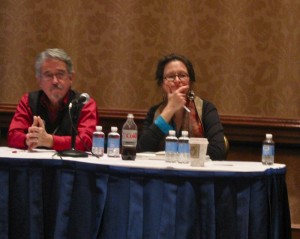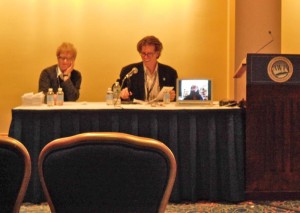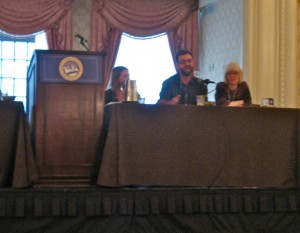The following post was written by Josie Keenan, Emily VanDusen, and Drake Misek, all interns at Fiction Writers Review through the Undergraduate Research Opportunity Program (UROP) at the University of Michigan.
Emily, on the pros and cons of the transmedia:

Photo Credit: Drake Misek
Particularly intriguing was the idea of how voice is affected not only in putting one’s work online, but also in coupling it with videos, images, or music. T.R. Hummer gave an especially moving narrative of the transmedia world as he gave us his background as a poet and a musician. In true poetic style, he described to what he called the “white monolith,” a machine he encountered in childhood that acted as both a scale and a horoscope. To Hummer, this machine was the first object that awoke him to the world’s wonder and possibility, and that gave him an introduction to the scope of meaning. Later, he developed a similar fascination for the saxophone, which he described as giving him a “saxophone voice” while simultaneously robbing him of his own voice. Picking up the musical instrument, he explained, was akin to dividing one’s voice from oneself, providing the “gift” of music while also inflicting the “wound” of losing the raw and imperfect quality of the soul. Technology, he insisted, works the same way as music to humans, providing us with tools to develop our voices while taking us away from where we came from—our ancestors and their traditions. Besides being poetic and thoughtful, Hummer’s story provided the panel with valuable insight about the possibility of digital media to both create and destroy. Consideration for this delicate balance, therefore, can make the difference between an effective media source and one one that is superfluous and overbearing—an important message for literary organization that provides multimedia tools and resources for online use.
Josie, on the role of communities in an online world:

Camille Dungy joins the panel via Skype. Photo Credit: Josie Keenan
The effects of space and time also played into the conversation, as the internet is in some ways removed from both: its space is virtual, and conversations in its ether exist in perpetuity. How does this absence of space and time affect interactions and the existence of community? All panelists agreed that in order to create a sustainable environment, members of the community must feel some sense of responsibility, referencing Delmore Schwartz’s story “In Dreams Begin Responsibilities.” This responsibility is a commitment to thoughtful engagement, so that the community can not only last but also have a meaningful existence. Sexton and Bauer, both of whom are avid chapbook makers, also argued for in the benefits of engagement with physical objects, of having a tangible connection. The panel ended with this question of how to make the virtual real, of how to make our online existences relevant and important in our actual lives. This is a question not easily answered but an important one to ask, and one we are researching and exploring at Fiction Writers Review.
Drake, on how print journals are making the jump to the internet:

Photo Credit: Drake Misek
Amber Withycombe, of UNLV’s Witness, moderated the panel, supplying guiding questions and topics to develop a picture of the print-to-digital issue. In her introduction, Withycombe asserted that, without a doubt, the move online necessitates reinvention. All of the panelists were involved with that reinvention, including Christina Thompson and Laura Healy of the Harvard Review, Tyler Meier of The Kenyon Review, Michael Nye of The Missouri Review, and Andrew Ciotala, of Bucknell’s West Branch.
Withycombe began the panel by asking, “Why go online?” The panel’s consensus: the digital format is necessary in the present, alongside print, but may even eclipse print in the future. The digital versions of the lit mags represented were launched only in the past few years, and all of them stand as an additional publication to the print edition. This new area of publication is so cheap that it barely affects the magazines’ budgets, except for an increased amount of contributor payments. The amount of submissions hasn’t changed much either, but more works are being accepted—great news for emerging writers!
Between these two formats of publication, a sort of “prestige gap,” has formed, as Ciotala and Thompson put it. In a few instances, writers have requested their work not be published if it is accepted only for the online lit mag. Many writers also voice a clear preference to be published in print, instead of digitally. But I wonder why. Online, we’ll be read more, and our work will be archived online. Wouldn’t it make sense for emerging writers to favor the emerging medium? This, too, is an important question that we at Fiction Writers Review must tackle.


